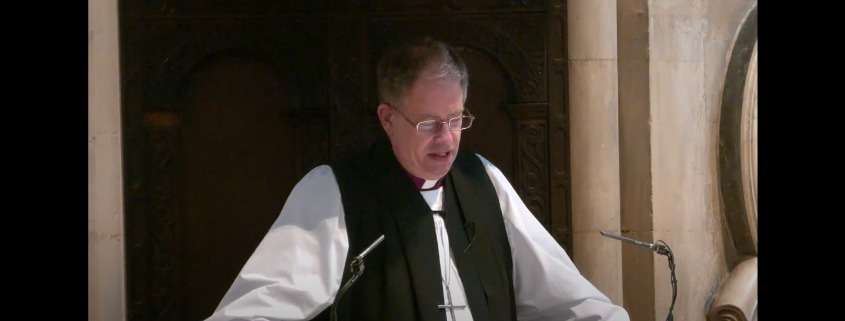Bishop Steven gave the following sermon at the Civic Service with Prayers for HRH the Duke of Edinburgh on Friday 16th April 2021
Some verses from our psalm:
For he maketh the storm to cease : so that the waves thereof are still. Then are they glad, because they are at rest : and so he bringeth them unto the haven where they would be.
We have all listened to many wonderful tributes to His Royal Highness Prince Philip over the last seven days and seen again many powerful images and photographs of his life’s story. I think my favourite is the picture which appeared on the cover of many newspapers yesterday morning: the Queen and Prince Philip with seven of their great grandchildren, taken at Balmoral in 2018.
The room is surprisingly tidy given the presence of so many small children. It is a picture of rest and peace, of the calm beyond the storm, the safe haven for which we long.
Sailing through storms seems an appropriate metaphor for a remarkable and distinguished life. From his childhood through to his final years, Philip’s life was disturbed by wind and waves, by the forces of chaos and change in tension with the order and stability he brought to those around him. He knew those storms in his youth and in his distinguished naval career, itself disrupted by the death of the king, his father in law.
He knew internal and external storms as he forged his life in the nation, the Commonwealth and the world as well as in his own family. He became a strong rock, an anchor and a source of stability, most of all to Her Majesty the Queen, a symbol of continuity. But he lived his life on the front foot, engaging with the issues of the day, with a lively, enquiring mind, often creating minor turbulence himself in the interests of change.
Prince Philip was a pioneer of the environmental movement long before it was fashionable through his patronage of the World Wildlife Fund. He invested continually in the next generation through the Duke of Edinburgh’s awards. He took the sciences, industry and technology seriously. He was a man of faith who coped with having to hear so many sermons by actually listening to them and quizzing the preacher afterwards with sharp questions.
He was a man who piloted his family through successive storms, each progressively sharper for being in the public eye. His life is testimony to the resilience of families, to the possibility of reconciliation between generations, to the capacity for good in a life well lived. Prince Philip must be one of the very few people who have lived to have offered a model to at least four generations with absolute consistency. I found when we met, as so many others have done, a deep courtesy, a keen, well informed mind and a rich sense of humour. Along with many others we give thanks for Philip’s life and pray for those who most mourn his death.
Sermons to or about the Duke of Edinburgh should not be long. But as we ponder the storm and safe haven, we must remember this: in our psalm as in the rest of the Bible, the sea is the great symbol of chaos, destruction and death.
When we read the words he maketh the storm to cease so that the waves thereof are still we remember Jesus Christ’s victory over death which we celebrate in this Easter season.
When we read: then are they glad because they are at rest we remember the Christian hope of resurrection, of peace at the last, of life which continues in new and deeper ways beyond death for Philip, we pray, and for ourselves.
And so he bringeth them unto the haven where they would be.
Amen.

